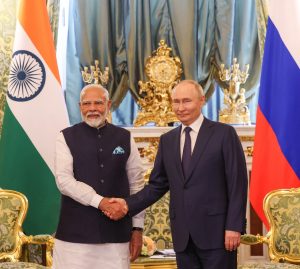For over two years, the United States and its allies have tried to isolate Russia’s President Vladimir Putin on the world stage. But in less than a month, Putin has scored two separate wins with two important U.S. partners in Asia, even as the bombardment of Ukraine has continued.
Last month, Putin went to Vietnam where he signed deals on energy cooperation and thanked that country’s “balanced position” on the war in Ukraine. This week, Putin received India’s Prime Minister Narendra Modi in Moscow where the two leaders pledged to strengthen bilateral ties and discussed ways to evade Western sanctions.
The two visits are significant because they serve to demonstrate not just the limits of Washington’s efforts to isolate Putin but also the limits of U.S. foreign policy in Asia and the Indo-Pacific.
For years, America has courted India and Vietnam as allies in a joint effort to counterbalance China’s rising influence in the Indo-Pacific. Economic and military ties have surged. Vietnam has been a key beneficiary of U.S. investment as Washington has tried to decouple from the Chinese economy. India is a partner in the Quad alongside Australia and Japan. Yet, none of this has stopped either India or Vietnam from steadily ramping up ties with Russia since the beginning of the Ukraine war.
In one sense, the historical basis on which these ties were founded has weakened. Russia has been a key supplier of weapons to India and Vietnam since the Cold War, but has lost out to competitors in both countries more recently.
According to the Stockholm International Peace Research Institute, Russia accounted for as much as 83 percent of Vietnam’s arms imports between 2010 and 2019. But since 2020, it has accounted for only 39 percent. In India, Russia made up 65 percent of total imports between 2010 and 2019. But since 2020, that figure has fallen to 36 percent.
Even as military cooperation has declined, ties have surged in other areas. India was once a marginal importer of oil from Russia. But since the beginning of the war, that has changed dramatically. In June, Russia made up 43 percent of India’s total oil imports, making India the second-biggest consumer of Russian oil behind China. In Vietnam, similarly, Russian energy companies have increasingly been involved in marquee oil exploration projects, including in the contentious South China Sea.
To some analysts in Washington, all of this might seem baffling and appalling. Why would countries that face threats from an expansionist China engage with an expansionist Russia? Russia’s weakening military footprint in the two countries would only add more mystery to that question. Driven by losses in the battlefield and pressures on its own defense industry, Russia has become a significantly less appealing military partner. In recent weeks, Russia’s military supplies have been so far stretched that Putin had to turn to North Korea for support.
Yet, even as the hard power rationale for ties with Russia has declined, the soft power strategic rationale has increased precisely because Russia is getting weaker. For India and Vietnam, a world without Putin is a world where they would be more vulnerable to the West. Russia’s exit from the club of world powers would restrict geopolitical space for countries like India and Vietnam, which seek to function within a raucous multipolar landscape where they stand a better chance at fending off U.S. hegemony.
That cause has only become more urgent to policymakers in New Delhi and elsewhere in the wake of a proliferation of Western sanctions around the world. Many countries in the Global South — or what Putin now calls the “World Majority” — believe that their continued dependence on Western economic systems and institutions leaves them vulnerable, if they were to fall afoul of the West down the line.
To that end, in Moscow, Modi and Putin were reported to have continued talks on a bilateral payment system to bypass restrictions on Russia’s use of the SWIFT channel for cross-border bank transactions. Countering the preponderance of the dollar and its concomitant institutions has also been a recurring theme at the BRICS and the Shanghai Cooperation Organization (SCO) in recent years.
All of this also serves to highlight a key point of difference between U.S. foreign policy objectives in Asia and the strategic goals of its partners in Asia — especially emerging powers like India and Vietnam.
The U.S. sees China as a threat on a wide range of issues. Washington perceives China as a strategic competitor to its power and influence on the world stage. But America’s partners in Asia see no real skin in that game. They would like to counteract China’s ability to intrude and occupy their territory. But they are also interested in ensuring a healthy balance of power in the region between China and the U.S. They calculate that Russia will be an important player in making that happen.
































